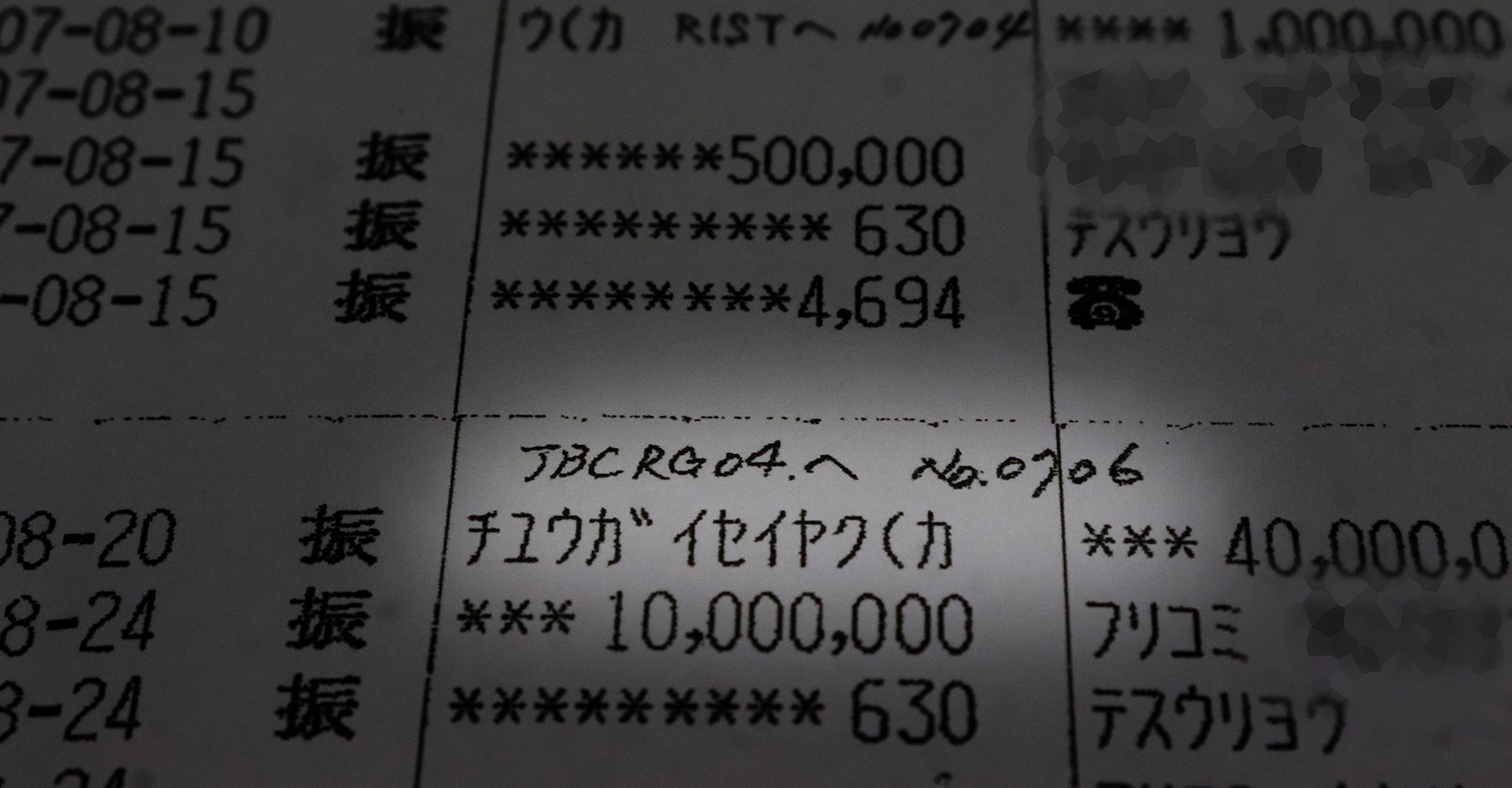A Cancer Study’s Secret Funder
“Chugai Pharmaceutical” written in the passbook
2020.05.07 18:42 Makoto Watanabe
3 min read

Photocopy of the ACRO passbook. A note that the funds are “for JBCRG04” was written by hand next to the payment from Chugai Pharmaceutical. The photo has been partially edited. (C)Tansa
Chugai Pharmaceutical secretly funded a clinical trial of its own anticancer drug by passing money through the nonprofit Advanced Clinical Research Organization. In the fall of 2018, an individual familiar with ACRO, who we’re calling X, handed over many of the organization’s accounting documents to Tansa and breast cancer surgeon Akihiko Ozaki.
The documents confirmed Ozaki’s suspicion about the trial’s funding. They provided a record of large payments from Chugai Pharmaceutical to ACRO specifically designated for the trial, with the first payment arriving six months before it began.
Together with Ozaki, we met with X again in Tokyo.
The note in the passbook
Our second rendezvous took place two weeks after the first, at the same café in the Tokyo suburbs.
We crowded around a single laptop and went through the ACRO accounting files one by one. It was a huge volume of data, and even X was seeing some of the files for the first time.
A photocopy of a passbook, a paper booklet that records bank account transactions, caught our eye.
The first time we met with X, they had shown us the clinical trial’s balance sheet for the years 2006 to 2008, which recorded the following payments from Chugai Pharmaceutical.

This is an English version, created by Tansa, of the original Japanese spreadsheet.
Would the passbook’s record of the transactions match?
The transaction from Sept. 11, 2006 was there, for the same amount. So was Aug. 20, 2007 and Sept. 22, 2008. The records of all three payments were exactly the same.
The payer recorded in the passbook was “Chugai Pharmaceutical.”
And the payment column contained a handwritten note: “For JBCRG04.”
JBCRG (Japan Breast Cancer Research Group) is the name of the group of doctors that conducted the clinical trial. The following “04” is the number it uses to refer to the trial of Chugai Pharmaceutical’s anticancer drug Xeloda.
X said the note had to mean that the money was intended for use in the Xeloda trial.
“Who wrote it?” Ozaki asked, raising his eyes from the laptop.
“An ACRO accountant probably made this note to remind themself that the payment was designated for a specific project,” replied X.
By passing the funds through ACRO, Chugai Pharmaceutical made sure no one knew where the money really came from. But the maneuver would be in vain if the funds got lost along the way, so an ACRO accountant added a handwritten note to make sure the money reached its intended destination.
The account book
On another day, we found more proof among the accounting documents that the donations from Chugai Pharmaceutical came with strings attached.
It was in an account book for ACRO’s bank account. The nonprofit recorded its bank transactions in an Excel file. The names of pharmaceutical companies filled the payer column.
Once again, “JBCRG04” turned up in the “division” column that indicated how the funds from Chugai Pharmaceutical were to be used. The payment dates and amounts matched the balance sheet and account passbook.
These three accounting documents confirm that the funds from Chugai Pharmaceutical had been intended for the Xeloda trial.
What did that make ACRO?
We decided to find more sources in addition to X.
.. To be continued.
(Originally published in Japanese on Dec. 11, 2019)
Footnote
*1 Ozaki, Akihiko, 2017, “Conflict of Interest and the CREATE-X Trial in the New England Journal of Medicine,” Science and Engineering Ethics (retrieved Dec. 6, 2019).
A Cancer Study’s Secret Funder: All articles
 Newsletter signup
Newsletter signup